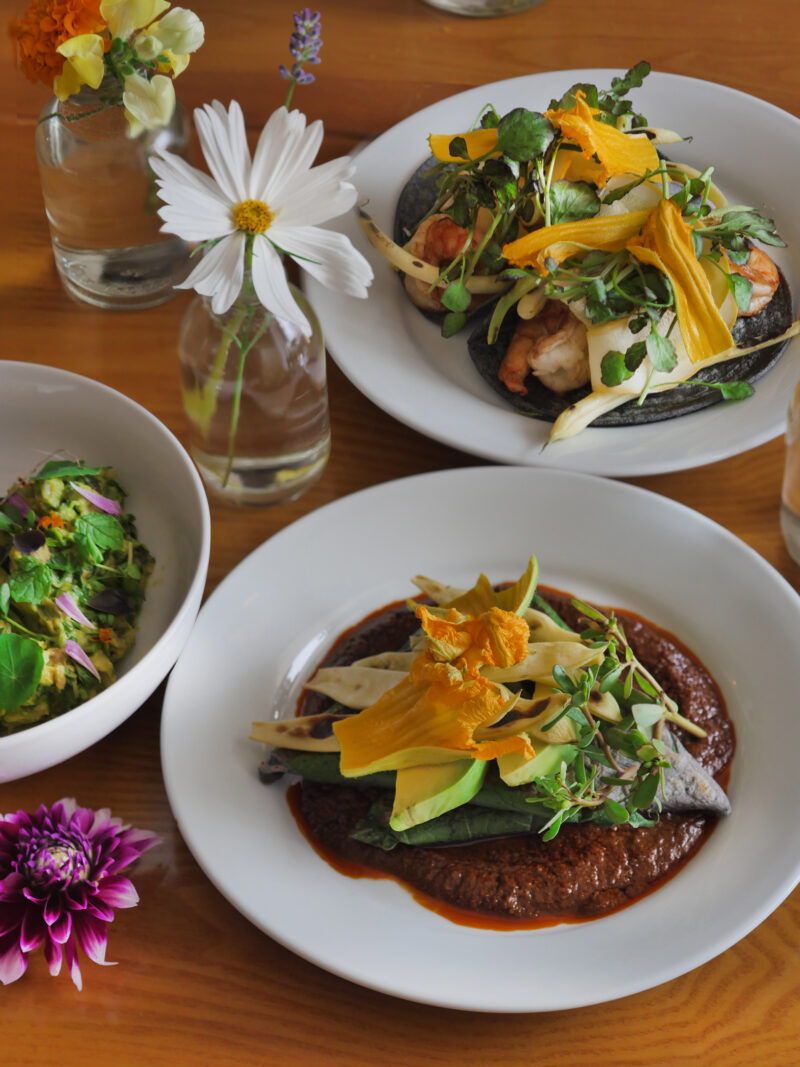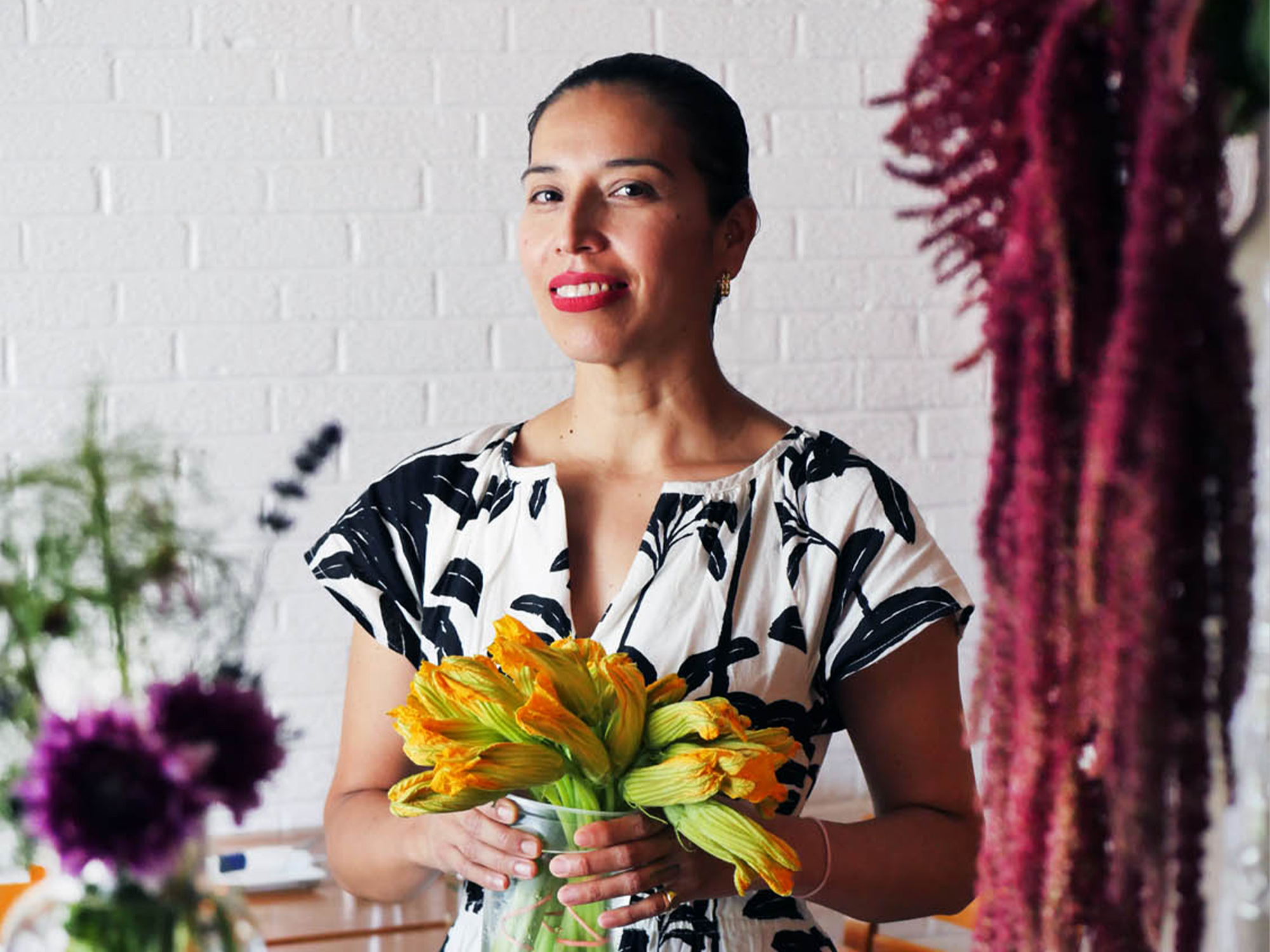Writing by Gia Miller
Photography by Justin Negard
When sisters Joana and Meto Herrera took over Armonk’s Mariachi Mexico from their father in 2013, they had one main goal: it should look, taste and sound just like home. During the restaurant’s long-standing January break, they transformed the Tex-Mex favorite into something that reminded them of Tlaxcuapan, the small town in Mexico where they grew up.
“We had a very different style, the opposite, really,” Joana, the chef, explains. “We’ve always liked less; we wanted to keep it simple. We wanted to focus on the menu, and we wanted a small menu. I don’t need to have five chimichangas on my menu. They’re all the same thing; the only difference is one is cheese, one is chicken, one is beef, one is veggie. That’s just not for me.”
During that month, everything “came down.” With the help of friends and family, they painted the walls white, installed new tabletops, revamped the bar and added a painted blackboard to list the daily specials. When they reopened, people were shocked.
“It was clean and respectful,” Joana describes. “No decorations. No tablecloths. No serapes on the wall. No fountain soda. No free chips and salsa. No Corona. And the music—there’s no way we were playing mariachi. I don’t listen to that in my house. Mexican people do not listen to it in their houses. We listen to mariachi when we celebrate, and then we move on. It’s not a celebration 24/7. Instead, we play jazz, bossa nova, a little hip hop and R&B—because that’s exactly what Mexican people listen to nowadays, especially this Mexican person.”
But they continued to call the restaurant Mariachi Mexico. Changing the name never even crossed their minds.
Growing up
Joana and Meto spent their formative years with their grandparents. Their father had mainly lived and worked in the U.S. since he was 17 years old, but he returned to Mexico frequently to visit family. He met their mom on a trip home, married her about a year later and they had two daughters (Joana and Meto), all while he primarily resided in the states. A few months after their mom gave birth to their younger brother, she also left for the states and brought him along. The girls stayed behind with their paternal grandparents who owned local salt mines; Joana was four years old and Meto was seven.
“Our culture there was very different, especially around food,” Joana recalls. “Grandma sourced everything fresh, and my grandpa was also a farmer. At that time, there was a big farming community. People grew different things, and at the end of the day, they would gather and exchange whatever they were growing and harvesting. So, it was common for my grandpa to come home with foraged greens, melons, hibiscus, corn or different kinds of squash. It was beautiful. And then grandma would put it all together to make a feast.”
The girls grew up cooking alongside their grandmother, as per tradition.
“My grandma would say, ‘Come, come see how I’m making this, so when you get married, at least you know how to cook,’” Meto remembers.
She taught her granddaughters how to make tortillas, salsa, beans—all the basics. From there, Joana continued to cook with her grandmother, but Meto did not.
“I didn’t like to cook,” she says.
Their life was simple. They lived in a small, quiet town where they walked to and from school, and everyone knew each other. When Joana was 12 and Meto was 14, their parents decided it was time for the girls to join them in the U.S. During those eight years with their grandparents, they had only seen their dad once and had not seen their mom or brother since they left. They’d also never met their younger sister, who was then six years old.
Joana and Meto moved to Brighton Beach and experienced a culture shock. They didn’t speak English, and they were living in a predominantly Russian community; the entire culture was different, and they didn’t really know their family.
“It was very difficult at the beginning,” Joana remembers. “But we were very fortunate that our grandmother was able to come along with us; that was very comforting. She stayed with us for the first year, and then she had to go back to Mexico.”
La vida
After their grandmother left, the sisters spent their weekends working at Mariachi Mexico, which had opened three years earlier. Their father worked in restaurants since he first moved to the U.S., working his way up from dishwasher to executive chef, beginning at a steakhouse and transitioning to a variety of high-end restaurants serving Tex-Mex cuisine in Manhattan, before becoming the executive chef at the former Pancho’s & Gringo’s in Mount Kisco.
“He loved his job in Manhattan, but it was just super busy in the city, and he wanted something different,” Joana explains. “So, he started working in Mount Kisco, and he loved it. He loved the commute, the restaurant, and the pace of the restaurant. Eventually, he wanted to start his own restaurant, and he really liked Armonk. He knew he wanted a certain energy and vibe, and he knew he wanted Tex-Mex cuisine because that style of cuisine was thriving, and it was what he knew how to do best.”
The sisters describe their father as a “traditional Mexican dad” who focused on teaching them responsibility and developing a strong work ethic.
“We started at the bottom, and he taught us everything,” Meto explains. “He even he taught us the right way to clean the floor. He would say, ‘No, no, no, it’s not that way. It should be this way.’ He believed we should know how to run a business from the bottom up.”
Meto and Joana both graduated high school and went on to college. Joana earned a journalism degree, and Meto studied business administration, but during her last year, she had a life-changing experience.
“I was in a severe car accident, and I was out for a couple of years,” she explains. “I had brain surgery, and I was in the hospital for about a month. I had to relearn everything–how to speak, how to walk. But I was very eager to go back to my normal life, so I pushed myself. The doctors were surprised that I recovered so fast.”
“She was basically reborn,” Joana adds. “She relearned everything. It was really bad; she couldn’t do anything. It was really shocking to see a human being be so independent, and then see the same exact person not be able to do anything on their own.”
“I remember really wanting to do things, but I just couldn’t,” Meto says. “I got very frustrated because they were such simple things, and I had to ask for help. My mom even had to bathe me. And later, I learned she made signs for our house telling everyone not to give me a mirror because my face was such a mess, and she didn’t want me to see it.”
When she was well enough to travel, Meto went to Mexico and stayed with her grandparents for almost a year. Her grandmother helped her heal.
The family business
When Joana graduated college, she went to work for her father, running the Mariachi Mexico location in Hell’s Kitchen, which he opened in 2000. Three years after her accident, Meto began managing both restaurants from home, only coming in occasionally.
“I was mostly front of the house, but I kept an eye on the kitchen, and I was able to get a few specials on the menu,” Joana remembers. “My dad was very specific about the menu, and he wasn’t really taking any additional opinions, but I somehow persuaded him to let me include a few specials, and they did fine.”
“One of them was a garlic soup,” Meto adds. “She added her own twist, and it was very popular.”
Their dad decided to sell the NYC restaurant in 2009, and Joana transferred to the Armonk location to run the front of the house. Meto continued to manage the business from home, eventually coming in on weekends and, finally, daily. Meanwhile, Joana began voicing her opinion about the menu.
 “I had my own idea of what Mexican food should be,” Joana explains. “And being in the front of the house, I had conversations with customers who told me what they were interested in. I felt we were at a turning point with Mexican food, and there was a little more interest in ‘clean’ food. I hate that word, but that’s what people called it.”
“I had my own idea of what Mexican food should be,” Joana explains. “And being in the front of the house, I had conversations with customers who told me what they were interested in. I felt we were at a turning point with Mexican food, and there was a little more interest in ‘clean’ food. I hate that word, but that’s what people called it.”
“So, I started having conversations with my dad, but he loved his style of food, and it was doing well, so that’s what he wanted,” she continues. “But my experience in the city told me it wasn’t just me, and customers would tell me they were wanting and longing for something different. Some wanted something with less cheese or less sauce, others with more veggies or a salad. I told my dad there was an opportunity here because people wanted change.”
Her dad repeatedly said no, but Joana persevered alone.
“She really liked to cook, but I wasn’t interested,” says Meto. “I’ve liked numbers since I was a little girl, so I stayed out of it.”
Two years later, Joana earned a “yes” by offering to make the dish when it was ordered. She began with a few salads, and customers loved them. Her dad was surprised, and he agreed to keep them on the menu, eventually hiring someone to prepare them.
“I remember the most popular one,” she says. “It was romaine lettuce, baby spinach and avocado with lime, olive oil, salt from my hometown and black pepper; that was it.”
Soon, Joana added salmon to the menu, which she seasoned with chiles and herbs her grandmother sent from Mexico. Joana would grind everything herself, add some hometown salt and then grill the fish.
“Families would come for dinner, and the wife would order the salad or salmon, the husband would order the fajita and the children would want the crispy tacos. It worked well,” she remembers. “I also added seasonal soups to the menu, like that garlic soup or a corn soup called chileatole.”
And then it happened: their father decided it was time to retire, and he began the process of transitioning the restaurant to his two oldest daughters.
A cold reception
When the sisters introduced their version of Mariachi Mexico in February 2013, their regulars made a statement of their own: they stopped coming.
“They disowned us,” Joana remembers. “We weren’t their children anymore. There were days when it was super quiet. And then the following week, it was busy, so we were able to make ends meet. But it was very, very rough. And that wasn’t only because it was hard to see an empty dining room; customers were very aggressive about everything. They would come in, sit down, look around and say, ‘This is not a Mexican restaurant. Where are your serapes?’ Then, they’d receive a menu, a small menu, and they’d ask, ‘Where are your fajitas and your chimichangas?’ When we explained the concept, they’d get really upset, put the menu down and walk out.”
Joana began to wonder if their restaurant would survive.
“They even complained about our beverages,” she remembers. “People would ask for Corona, and when we told them there was no Corona, they’d get mad. Then, they’d order a soda, and when we brought out a small, eight-ounce glass bottle, they’d be furious.”
“The only reason we’re still here is because Joana had so much passion,” Meto adds. “But I was the one doing the books, and I had to tell her we needed to bring something back because we needed to pay our bills so we could continue. She understood, and that’s how the steak burrito came to be.”
Joana “compromised,” creating a burrito that’s “more like a fajita.” It’s filled with rice, black beans, baby spinach, caramelized onions, roasted red peppers and medium rare skirt steak; served with guacamole, sour cream and a spicy sauce on the side. It remains the only burrito on their menu.
“This burrito shows that someone cares,” Joana explains. “I’m not just throwing stuff at people. I might not be big on burritos, but I’m going to make the best version of a burrito that I can think of, and it’s going to reflect who we are.”
She then added tacos to the menu. But the homemade tortillas (one, not two, per taco) were smaller in size, and she didn’t serve rice and beans on the side because that is not how it’s done in Mexico.
Customers continued to complain. This time, they complained about the price, even though it accurately reflected the quality of the ingredients. They complained about the small portions. They complained about the missing rice and beans. They were ordering it, but they were complaining.
“They complained about everything,” Joana remembers. “How can we charge for chips and salsa? Because our chips were different; instead of little triangles, ours are half-moons.”
Meto, the sister who doesn’t like to cook, decided to hand make each chip herself; she cuts chip-style tortillas in half and fries them.
“I make them one by one,” she says. “That way they are nice and flat. If you throw a bunch in at once, they will curl or break. And if a chip breaks, we toss it. Each one should be perfect.”
Starting to warm up

About four years after the sisters took over, people finally began to “get it.”
“In 2016, we began working at the Hastings Farmers Market because I was sourcing from there,” Joana explains. “We started selling quesadillas, plazeras, vegan tostadas, vegan tacos, pozole, champurrado and tamales, and that crowd liked it.”
“And then,” Joana continues, pausing to compose herself, “some customers who were supportive of my dad came back and had a conversation with me. I still remember it, and I cherish it so much. I’m grateful for it. They wanted to reassure me. They said, ‘At the beginning, we were a little skeptical, because we would come in, and this was our home, so to see it change made us wonder what was going to happen. But we see what you’re doing, and you’re doing a fantastic job. We love what you do; just keep going. You’re doing fantastic, and we’re so proud of you.’ And now, some of those customers are here every week, and if they don’t come in, they’ll call for takeout.”
As their business became more stable, the sisters became more adventurous. But they also remained cautiously optimistic, and Meto kept the finances in check.
“Our focus is on quality, not quantity, and not a lot of customers understand that,” Meto remarks. “Joana really wanted to work with heirloom corn because the texture and flavor are better, but I had to tell her it wasn’t doable yet. It’s three times more expensive, and we wouldn’t be able to survive if we raised the prices again. She understood. We complement each other. I’m the numbers, and she’s the creative.”
Finally, the accolades began to pour in. They were recognized in Eater’s March 2022 guide to the best restaurants in Westchester, featured in Lohud in July 2023 and The Infatuation in November 2023. Then the big one came: on February 15, 2024 USA Today listed Mariachi Mexico as one of their Restaurants of the Year.
“We were presented with 46 other restaurants nationwide, and it was insane—right away our website crashed,” Joana remembers. “People were coming from everywhere—New York City, Connecticut, New Jersey and throughout Westchester. But not Armonk. It reminded me of a famous Mexican saying my grandma would tell me, ‘Nadie es profeta en su propia tierra.’ It means ‘no one is a prophet in their own land.’”
Today, they have “really great customers” who live in Manhattan’s Lower East Side and others who drive up from Brooklyn, but there are very few regulars who live in Armonk. And even with all the accolades, the sisters say some days are still slow.
True originals
Joana continues to dream. She wants to purchase heirloom corn directly from farming communities in Mexico and grind their own masa in the restaurant, make her own cheese for their quesadillas, create an even more seasonal menu and more. And she’s also very passionate about being local.
“I source everything personally. On Wednesdays and Fridays, my day starts at 5:30 because I go to the Union Square Greenmarket. It’s not easy; I take Metro North and the subway, carrying everything myself. It’s so important to support local communities, to really support local whenever possible. When people come to Mariachi’s to have dinner, celebrate a birthday or even just for a drink, then I’m able to go every Wednesday and Friday morning and support those local, family-owned farms, along with everyone who works here.”
And although she’s more the pragmatist, Meto shares the same goals and dreams.
“I really hope to be here in another 30 years,” says Meto. “And I am excited to see what we do next. Joana really wants to have more premium ingredients, and we will slowly work towards that goal. It’ll take a little longer, but it’s worth it because it’s who we really are and how we feel. But I can’t wait to see the heirloom corn masa come in.”
To read other Connecting in the Kitchen articles, click here.
This article was published in the September/October 2024 edition of Connect to Northern Westchester.









